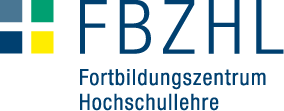Completed Projects
Through projects funded by the Quality Pact for Teaching, the federal-state program for improving study conditions and quality of teaching by the German Federal Ministry of Education and Research (BMBF), the FBZHL has expanded its offers. Accompanying demand assessments and evaluations provide important information on how further education in various educational (subject) contexts should be conducted.
Project Higher Education Teaching – ProfiLehrePlus
Within the existing cooperation between Bavarian universities, the certified higher education teaching training has been systematically improved through the BMBF-funded project “ProfiLehrePlus – University Teaching 2020”.
Under the ProfiLehrePlus alliance, the higher education teaching institutions at all Bavarian universities have come together to create a shared space for further education. By centralizing and systematizing the individual university-based further education programs, significant added value is provided to instructors.
The FBZHL’s Project Objectives
Faculty-specific Further Education Program
In order to meet the diverse didactic framework conditions of the faculties and their teaching formats, measures for improving teaching have been developed and evaluated in collaboration with and for individual instructors, teaching teams, chair holders, module coordinators, or quality management staff. For more information and best practice examples, please visit our page for faculty-specific program.
As part of this initiative, a special certificate course for postdoctoral students in medical didactics, qualifying participants for the “Medizindidaktik Bayern der Grundstufe” certificate, was developed in collaboration with the Medical Didactics department at the University of Würzburg specifically for the Faculty of Medicine at FAU.
In diesem Rahmen ist für die Medizinische Fakultät der FAU in Kooperation mit der Medizindidaktik der Universität Würzburg ein spezieller Zertifikatslehrgang für Habilitierende entwickelt worden, der die Teilnehmenden für das Zertifikat „Medizindidaktik Bayern der Grundstufe“ qualifiziert.
Correspondent Training
Qualitative Mid-Term Evaluation
To facilitate the lively illustration of the process and the complex interactions during QZE, a video-based teaching and learning situation was developed. It is used in the training of student moderators and can be accessed on YouTube.
Significant results achieved within the project have been made publicly available through publications, conference contributions, and didactic guidelines:
Selected Publications
- Jahn, D., Kenner, A., Kergel, D., & Heidkamp-Kergel, B. (Hrsg.). (2019). Kritische Hochschullehre: Impulse für eine innovative Lehr- und Lernkultur. Springer VS.
- Jahn, D. (2019). Zur Förderung kritischen Denkens: Synthese der Ergebnisse einer Metastudie mit den Einsichten aus einem handlungstheoretischen Prozessmodell. die hochschullehre, Jahrgang 5/2019, 905–930. [PDF]
- Jahn, D., & Kenner, A. (2018). Hochschuldidaktische Entwicklungsforschung in Serviceeinrichtungen. In B. Berendt (Hrsg.), Neues Handbuch Hochschullehre. (Bd. 85, S. 1–22). DUZ Verlags- und Medienhaus.
- Jahn, D., Tress, D., Attenberger, C., & Chmel, L. (2018). Lernvideos können mehr als nur Erklären: Eine Studie zum Einsatz von narrativen Film-Ankern in einer hochschuldidaktischen Online-Weiterbildung. In J. Buchner, C. F. Freisleben-Teutscher, J. Haag, & E. Rauscher (Hrsg.), Inverted classroom – Vielfältiges Lernen (S. 149–164). ikon Verlag. [PDF]
- Jahn, D., & Kenner, A. (2018). Critical Thinking in Higher Education: How to foster it using Digital Media. In D. Kergel, B. Heidkamp, P. K. Telléus, T. Rachwal, & S. Nowakowski (Hrsg.), The Digital Turn in Higher Education (S. 81–109). Wiesbaden: Springer VS. [Link]
- Jahn, D. (2017). Entwicklungsforschung aus einer handlungstheoretischen Perspektive: Was Design Based Research von Hannah Arendt lernen könnte. EDeR – Educational Design Research, 1(2), 1–17. [PDF]
- Jahn, D. & Hagelgans, H. (2016). Entwicklungsforschung als Element Hochschuldidaktischer Forschung. In: K. Zierer (Hrsg.), Jahrbuch für Allgemeine Didaktik 2016 (S. 154–165). Schneider Verlag Hohengehren.
- Jahn, D. (2013). Was es heißt, kritisches Denken zu fördern. Ein pragmatischer Beitrag zur Theorie und Didaktik kritischen Nachdenkens. In: Mediamanual Nr. 28. [PDF]
Guidelines
- Jahn, D., Baldioli, C. & Tischer, M. (2020). Die Studierenden nicht aus dem Blick verlieren! Ein Miniratgeber für die Gestaltung studierendenfreundlicher Online-Lehre in Zeiten von Corona. In: Schriften zur Hochschuldidaktik. [PDF]
- Jahn, D.; Gerner, V. & Schmidt, C. (2019). Blended Learning: Die richtige Mischung macht’s! Ein praktischer Ideengeber für digital unterstützte Lehr-/Lernkonzepte. [PDF]
- Cursio, M., Hahn, A. & Jahn, D. (2015): Kompetenzorientiertes Prüfen. Ein Leitfaden zur Qualitätssicherung. In: Schriften zur Hochschuldidaktik. [PDF]
- Jahn, D. & Kenner, A. (2015): Hausarbeiten anfertigen. In: Schriften zur Hochschuldidaktik. [PDF]
- Cursio, M. & Jahn, D. (2014): Leitfaden Selbststudium: Workload ermitteln und kommunizieren. In: Schriften zur Hochschuldidaktik. [PDF]
- Jahn, D. & Baldioli, C. (2014): Die Qualitative Zwischenevaluation (QZE): während des Semesters ein wertvolles Feedback aus Sicht der Studierenden erhalten. In: Hochschuldidaktische Schriften. [PDF]
- Cursio, M. & Jahn, D. (2014): Leitfaden zur Formulierung kompetenzorientierter Lernziele auf Modulebene. In: Schriften zur Hochschuldidaktik. [PDF]
- Jahn, D. & Kenner, A. (2013): Erfolgreich studieren am Fachbereich Wirtschaftswissenschaften der Friedrich Alexander Universität Erlangen-Nürnberg. Lernstrategien für Erstsemester. [PDF]
Short Report

Project QuiS – Quality in Studying and Teaching
With the project “Quality in Studying and Teaching at FAU – QuiS,” Friedrich-Alexander-Universität Erlangen-Nürnberg aims to facilitate the transition to university studies, reduce dropout rates, and improve overall teaching quality. Since mid-2012, the QuiS project has been successfully implemented at FAU. QuiS aims to ease the transition into university studies, reduce dropout rates, improve teaching quality, and enhance student satisfaction. For the second funding phase (2017-2020), four general focal points have been identified: dealing with heterogeneity, digitization of teaching, internationalization, and strengthening interdisciplinarity. The FBZHL is involved in the following subprojects (SP):
SP 13: Education and Training of Tutors
SP 14: Practice-oriented Mediation of Higher Education Didactic Research to Instructors

Erasmus+ Project CACTLE –
Implementing a Central Asian Center for Teaching, Learning and Entrepreneurship (completed)
The FBZHL was a partner in the EU project CACTLE, which aimed to implement a Central Asian Center for Teaching, Learning, and Entrepreneurship.
